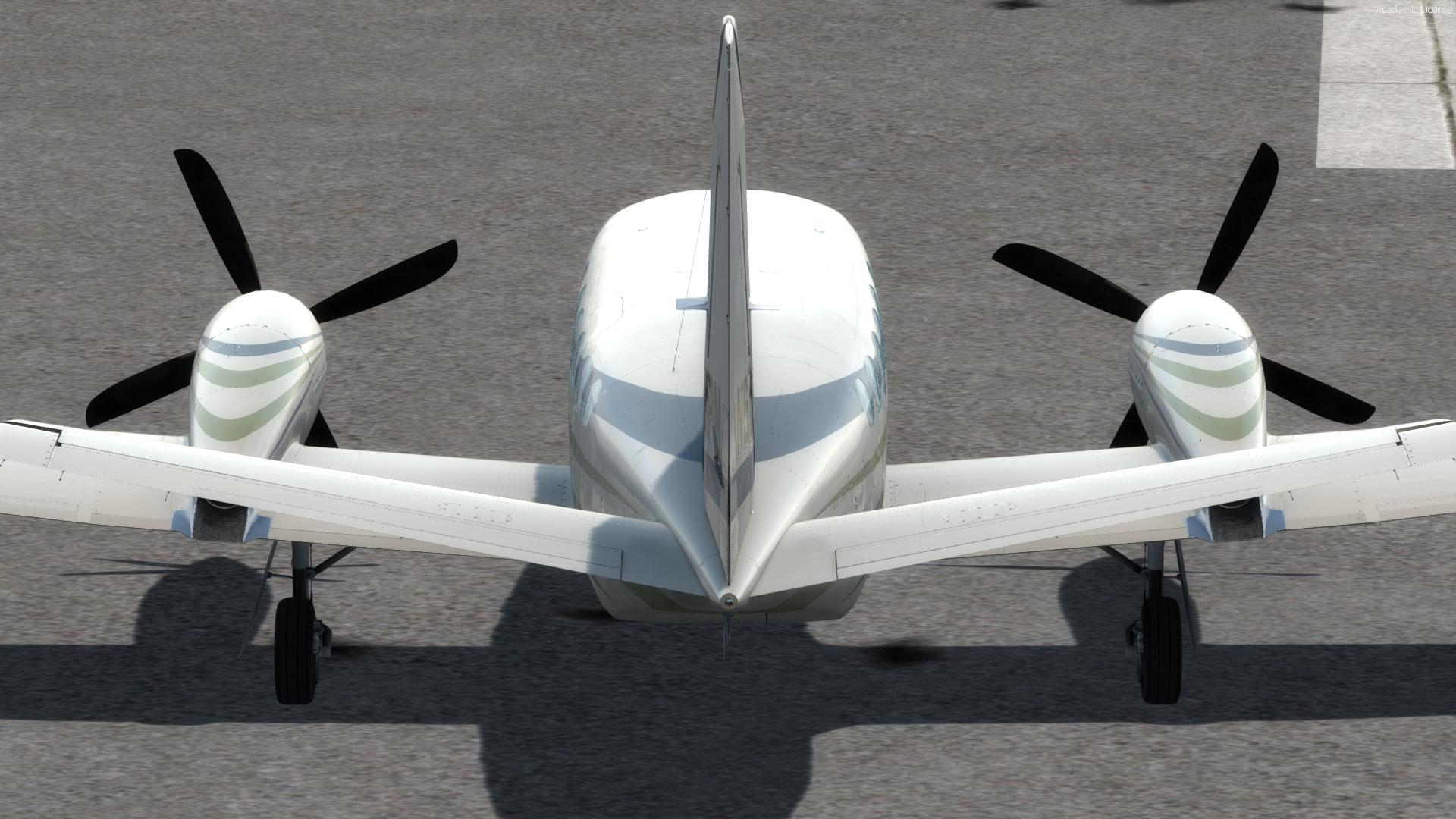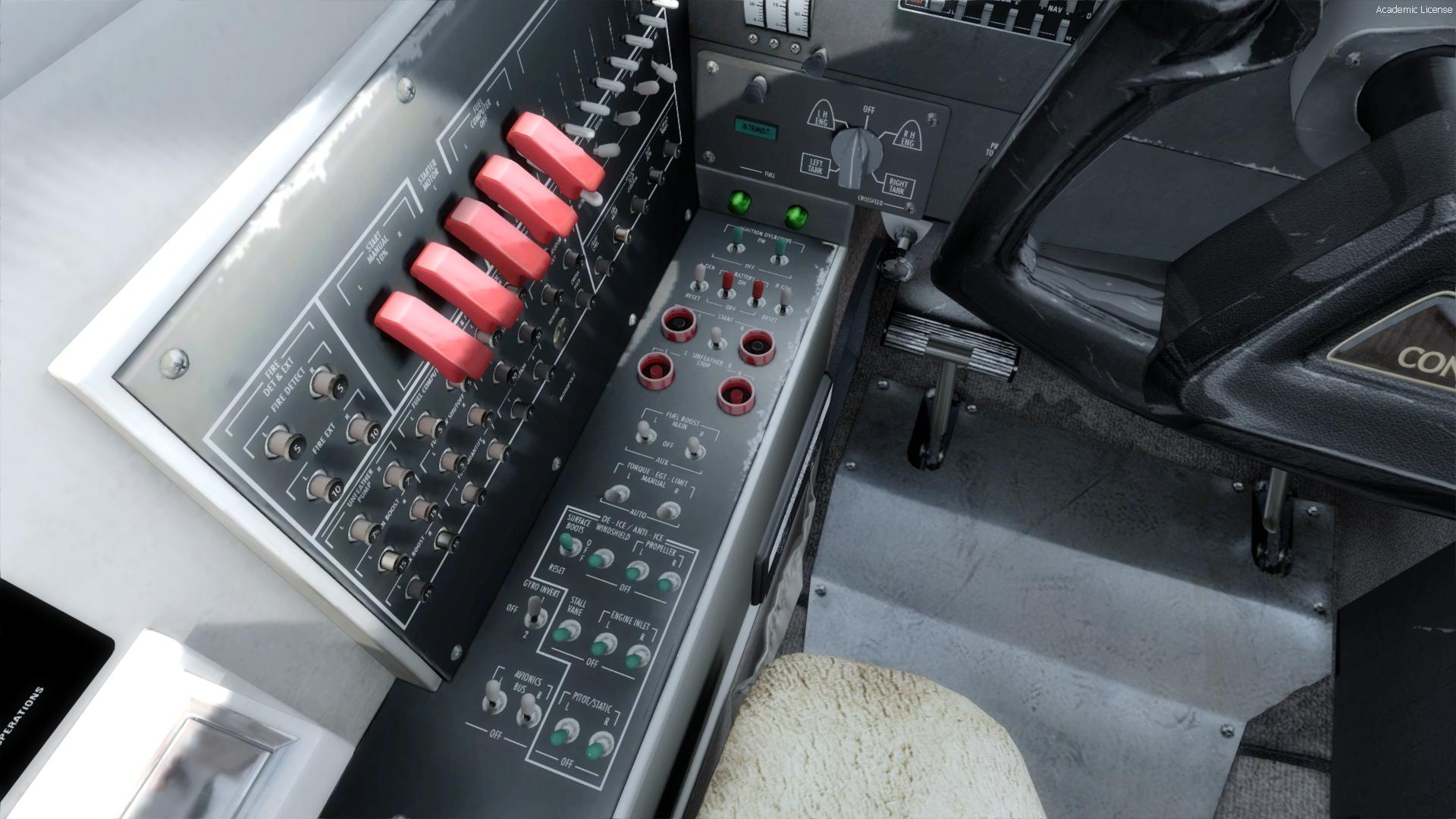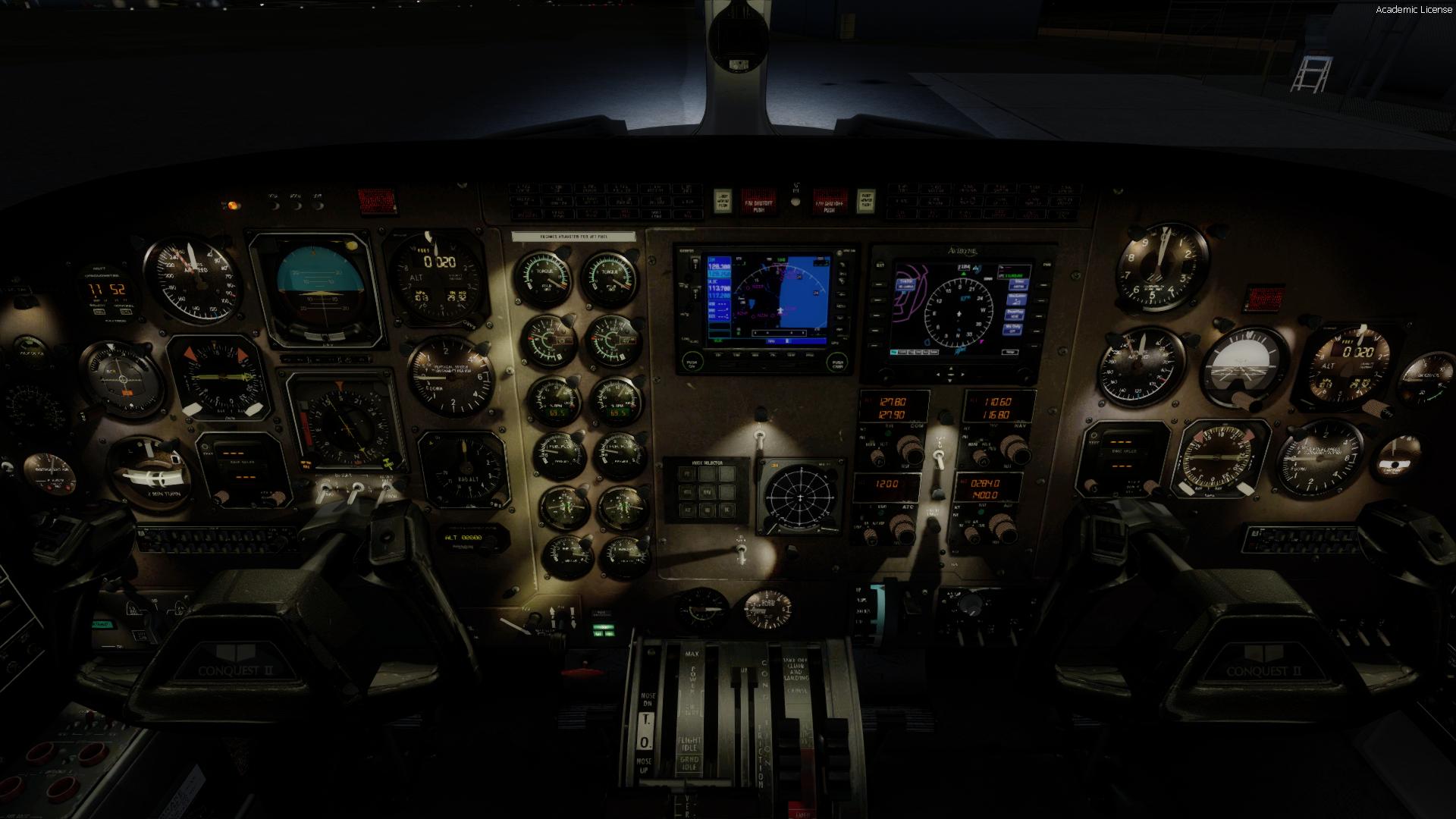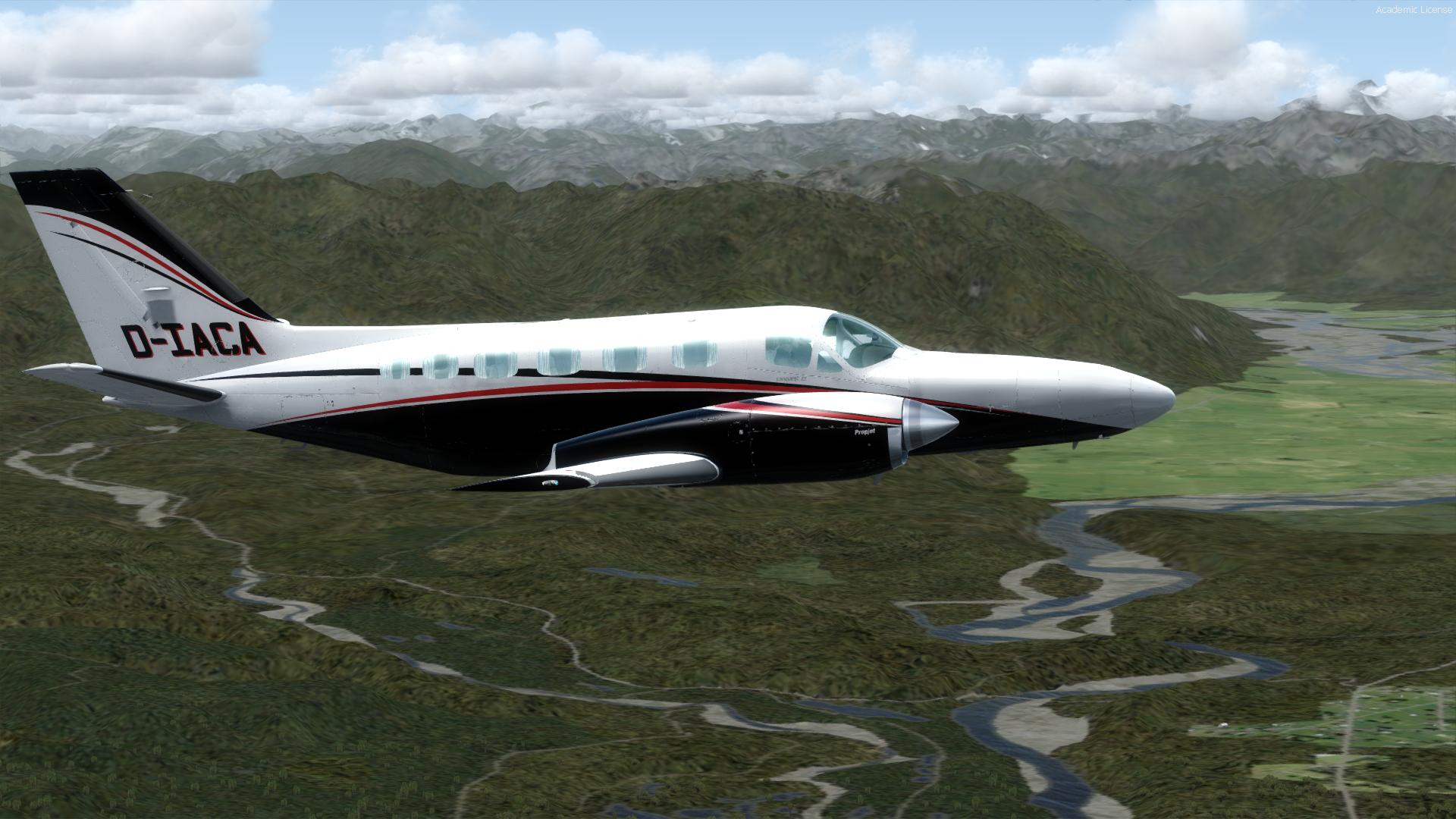Introduction
From its founding as a company in 1927, Cessna firmly established itself in the single piston engine, general aviation category. Even though the company had produced the T-50 Bobcat from 1934 to 1944, it wasn’t until 1954 when Cessna started producing its first modern twin engine aircraft, the Cessna 310. This was followed in the 1960s by the likes of, among a range of other models, the Cessna 336/337, Cessna 340, and Cessna 401. It was during this time, that Cessna also started the development of the first of their business jet range, the Cessna Citation I. Something was still missing in the Cessna aircraft range though, a turboprop aircraft. It would still take until the mid-1970s when Cessna developed an aircraft to fill the gap between their piston engine and jet aircraft, and so, the Cessna 441 Conquest II was born.
Alabeo continue to focus on producing aircraft which, whilst not necessarily the most famous or most produced, are iconic aircraft in their own right for the history or development significance they represent, a position which the Cessna 441 Conquest II fits more than adequately. So, if you are a flight simming general aviation devotee, a fan of Cessna aircraft, or twin engine aircraft in general, then the Alabeo Cessna 441 Conquest II is something to seriously look at.
History
The Cessna 441 Conquest II is a twin engine, pressurised, low wing monoplane in the general aviation aircraft category. It is powered by a pair of Garrett TPE331-8 turboprop, 636 shp engines and has seating for up to 10 passengers. Developed from the Cessna 404 Titan, the Cessna 441 Conquest II was designed to fill the gap between Cessna’s piston engine and jet aircraft. Its first flight was in 1975 and the aircraft entered production in 1977. Operated by corporate owners, air charter operators, and most notably, the Royal Flying Doctor Service in Australia, the Cessna 441 Conquest II ceased production in 1987 after a production run of 362 aircraft.
Availability and Installation
The Alabeo Cessna 441 Conquest II is currently available direct from Alabeo and Alabeo resellers as a download only product (some resellers also offer a master back-up CD / DVD service for a minor additional cost). It is priced at US$34.95, or the equivalent on currency cross rates. The download file size is 400MB and it requires 990MB of HDD space for installation. An activation key is issued on purchase and is used during installation and the installation process is intuitive and seamless.
Model Features
The model features listed by Alabeo for the Cessna 441 Conquest II are typical of models in the Alabeo range and include:
high quality 3D model;high definition textures;
Alabeo Garmin GNS 530 GPS unit;
Stormscope weather radar (operates in FSX only);
Flight1 GTN 750 integration;
Reality XP GNS 530 integration (FSX only);
gauge reflections and window scratches;
material shines and reflections;
volumetric side view propeller effect; and
realistic behaviour.
Visual Appearance
General Exterior and Interior. The design of the Cessna 441 Conquest II typifies general aviation twin engine aircraft of the era and it follows the design lines of its pedigree, the Cessna 404 Titan. Alabeo have modelled the Cessna 441 Conquest II on an early production variant and they have done this aircraft justice in capturing the distinctive appearance with the elongated nose and very distinctive, compact profile, Garrett turboprop engines. The interior is modelled on an executive configuration with a cabin layout of four seats in a club seating arrangement, two individual seats, and a generous luggage storage space at the rear. Textured wood panels, seating, carpet, and padded side panels are typical of the model and consistent with the quality seen in the Alabeo model range. The cabin is luxuriously appointed, but is still presented with a degree of wear and tear to give a realistic and true appearance and feel of an aircraft of this type. The lambswool seat covers on the pilot and co-pilot seats are a nice touch of comfort and should make those long trips more comfortable.
Flight Instruments and Systems. The cockpit of the Cessna 441 Conquest II represents the typical layout for the aircraft and the production period. The standard analogue flight instruments are typical of the model range and consistent with an aircraft of this category and age, and they are supplemented with the Garmin GNS 530 GPS unit. Whilst the Stormscope is present, it is only functional in FSX.
Models and Liveries. The Cessna 441 Conquest II is provided in a single model with five individual liveries (a selection only shown below). Each aircraft has a unique aircraft registration number and there is an additional blank texture for aircraft painting enthusiasts. Displaying the usual Alabeo high quality, the surface textures, reflections, and shadings, along with additional scuff marks, scrape effects, dirt, oil, and grease stains, give each aircraft a realistic appearance.
Summary, Issues, and Variations. Alabeo have followed in the footsteps of their sister company, Carenado, representing their products with an extremely degree of quality and realism and the rendition of the Cessna 441 Conquest II is consistent with this. The aircraft is highly detailed and accurate, the visual quality is excellent, and it provides a faithful representation of the real-world aircraft. The photo like qualities of the interior make for an easy and pleasurable environment in which to fly and all elements of the cockpit are clear and easy to read, with the typical range of various alternative cockpit camera views to provide more detailed clarity. Any noted visual variations were minor and are considered to be related to real world production variations or a degree of artistic licence on the part of the developer. Any noted issues and variations with cockpit functions and operation were considered minor and / or in the interests of simplifying the function for practical flight simulator use.
Animations, Lighting and Sounds
The animations of the primary and secondary control surfaces and other moving elements on the Cessna 441 Conquest II are all modelled faithfully and include:
primary control surfaces – ailerons, elevator, and rudder;
secondary control surfaces – flaps;
others – elevator and rudder trim tabs, cabin door, baggage compartment door, avionics bay door, and cockpit windows; and
various static elements.
The lighting and lighting effects on the 441 Conquest II are excellent and are a realistic representation of the real world aircraft. The engine sounds are a very good representation, delivering the typical high pitched sound of a turboprop, and with good stereo separation with view movement in the Virtual Cockpit view and external views.
General Characteristics and Performance Specifications
The general characteristics and performance specifications for the Cessna 441 Conquest II are provided in the table. This is based on data from the official Cessna 441 Conquest II Pilot Operating Handbook, data provided by Alabeo, and general research sources. Some of this data varies between sources and also may be an approximation due to variances in data and the specific aircraft modelled by Alabeo.
General Characteristics
| Crew | One/Two |
| Passenger Capacity | Up to 10 |
| Length | 39 ft 0 in (11.89 m) |
| Wingspan | 49 ft 4 in (15.04 m) |
| Height | 13 ft 2 in (4.01 m) |
| Empty Weight | 5,682 lb (2,577 kg) |
| Fuel Capacity | 488 US gal (1,847 l) |
| Maximum Take-Off Weight (MTOW) | 9,850 lb (4,468 kg) |
| Power Plant | 2 x Garrett TPE331-8 turboprops, 636 shp (474 kW) |
Performance Specifications
| Maximum Speed | 295 kts (340 mph, 547 km/h), at 16,000 ft |
| Cruise Speed | 259 kts (298 mph, 480 km/h), at 35,000 ft |
| Stall Speed | 75 kts (86 mph, 139 km/h) full flaps, gear down, engine at idle |
| Range | 2,194 nm (2,525 mi, 4,064 km) at 35,000 ft |
| Service Ceiling | 35,000 ft (10,700 m) |
| Rate of Climb | Approximately 2,435 ft/min (742 m/min) |
Flight Performance
A specific Test Flight was conducted to test the flight performance of Alabeo’s Cessna 441 Conquest II. The flight was conducted in clear weather with a full fuel load and the aircraft at maximum take-off weight (MTOW). A cruise altitude of 25,000 ft was adopted and the route distance was particularly chosen to provide a basis upon which to test the range characteristics of the 441 Conquest II.
The aircraft was easy to taxi. With flaps set to the take-off position, aircraft rotation occurred at approximately 100 KIAS and effortlessly lifted off the runway, with a climb out which was expected for the aircraft. The 441 Conquest II is not only very agile, it is a virtual rocket and it quickly establishes on the climb to cruise with its rate of climb of over 2,400 ft/min. This made the climb effortless and quickly established the aircraft at the cruise altitude.
During cruise, a power setting was established for cruise as per the performance tables. This cruise setting produced an average speed, fuel flow rate and an endurance reasonably consistent with the performance tables and the characteristics of the aircraft. Any noted variances in performance were minor and had negligible impact on the operation of the aircraft. The Test Flight confirms the modelling of the aircraft for speed and range performance to be reasonably accurate.
Configured for landing, with full flaps, and trimmed for a descent rate of approximately 500 ft/min, the aircraft’s approach speed was approximately 100 KIAS and it touched down at approximately 90 KIAS, with a landing roll out comparable with the specifications for the aircraft.
In testing the accuracy of the instruments, based on the measured Test Flight, the speed indications on the airspeed indicator, were consistent with the averages measured. Additionally, when establishing a set rate of climb on the vertical speed indicator, the respective gain in altitude on the altimeter was achieved within the measured minute, and a standard rate turn was achieved within the measured two minute period using the turn coordinator.
The performance of Alabeo’s Cessna 441 Conquest II was excellent in flight, displaying the expected general flight characteristics of this aircraft. The aircraft’s handling characteristics are very good, and it exhibits the typical high performance of a turboprop. It is agile and responsive to control inputs and also very steady once trimmed for level flight or established on approach. Overall, the aircraft model displays a reasonably accurate rendition of the flight characteristics and performance expected of this type of aircraft.
Documentation
There are eight primary manuals / documents provided in Adobe Acrobat format (.pdf) for the Cessna 441 Conquest II:
Alabeo Garmin GNS 530 GPS - this two page document details the operating of the Alabeo Garmin GNS 530 GPS unit;Stormscope – this one page document details the operating of the WX-11 Stormscope;
Avidyne Multifunction Display - this 13 page document details the operating of the Avidyne multifunction display unit;
Cessna 441 Performance Tables – this four page document details the performance tables for the aircraft;
Cessna 441 References - this one page document details the airspeed limitations for the aircraft;
Cessna 441 Normal Procedures - this five page manual details the procedures for the normal operation of the aircraft;
Cessna 441 Emergency Procedures – this 20 page manual details the emergency procedures for the aircraft; and
Recommended Settings – this two page document details recommended display and realism settings for the aircraft.
Additional documents provide information for P3D users and information on the integration of the Flight1 GTN 750 and Reality XP GNS 530 GPS units.
Value for Money
This is another Alabeo product at the upper end of their price range. As I have noted before with other models, there appears to have been price creep in the Alabeo product range over recent years. Nonetheless, on a value for money assessment, the Alabeo Cessna 441 Conquest II is still considered good.
Simulator Performance
The aircraft model performed excellently within the existing settings I have in P3D. I have most of my settings set very high and there was no need to make any adjustments. There was no discernible frame rate impact directly attributable to the Alabeo Cessna 441 Conquest II and P3D continued to perform smoothly.
Technical Requirements
This version of the Alabeo Cessna 441 Conquest II is for FSX / FSX SE / P3D only. Other specified technical requirements are as follows:
Windows Vista / 7 / 8 (32 or 64bit);
FSX with SP1 and SP2 installed (or Acceleration Pack), FSX Steam Edition, or P3D Flight Simulator (v2.5 or v3.4); and
Pentium V, 2GHz or similar, 2GB RAM, 512MB graphics card, and 990MB available HDD space.
Review Computer Specifications
The specifications of the computer on which the review was conducted are as follows:
Intel i7 990X Extreme 3.46GHz;
NVidia GTX980 G1 Gaming, 4GB, 1228/1329MHz;
12GB, Kingston DDR3, 2000MHz, XMP T1 CL9 HyperX;
Windows 7, (64bit); and
Lockheed Martin P3D Version 3.4.
Additional Major Add-ons. Active Sky Next, FS Global Ultimate region series, Orbx FTX Global BASE, Orbx FTX Global VECTOR, Orbx FTX Global openLC series, Orbx FTX region series, Orbx FTX airport series, and Orbx FTX Trees HD.
Conclusion
The Cessna 441 Conquest II is a marvellous, high performance turboprop aircraft. Alabeo’s attention to detail and quality are again evident in the accuracy of this model. The overall performance characteristics of the 441 Conquest II are consistent with this type of aircraft and Alabeo have done a marvellous job of modelling this wonderful aircraft.
Verdict and Scores
Verdict
| The Cessna 441 Conquest II is another great Alabeo product for the general flight simming enthusiast. |
Scores
For |
Against |
Category |
Score |
|---|---|---|---|
| Excellent quality Textures and attention to detail | At the upper end of the Alabeo price range | External Model | 10 |
| Great handling and flying performance | Internal Model | 10 | |
| Sounds | 9.0 | ||
| Flight Characteristics (does it fly by the numbers) | 9.5 | ||
| Flight Dynamics (does it feel like what it looks like) | 9.5 | ||
| Documentation | 10 | ||
| Value for Money | 8.5 |
Overall Score

The Alabeo Cessna 441 Conquest II is awarded an overall Mutley's Hangar score of 9.5/10,
|




























